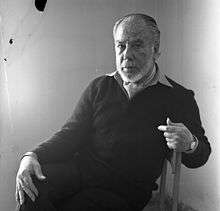Ramón Gaya
| Ramón Gaya | |
|---|---|
 | |
| Born |
Ramón Gaya Pomés October 10, 1910 Murcia, Spain |
| Died |
October 15, 2005 (aged 95) Valencia, Spain |
| Nationality | Spanish |
| Known for | Painting, Drawing, Writer, Poet, Essayist |
| Awards | Velázquez Award of Plastic Arts, 2002. |
Ramón Gaya y Pomez (1910-2005) was a Spanish painter and writer.[1]
Biography
Ramón Gaya was born in Murcia to Catalan parents Salvador Gaya and Josefa Pomés. His parents had moved to Murcia so that Salvador could engage in his profession of lithography better. Ramón's father had some painter friends, Pedro Flores and Luis Garay, who helped instruct Gaya in art in his early years. He left school early to pursue the profession of painter. Gaya became a follower of Cubism, and was encouraged by Pablo Picasso. Already at the age of 17, Gaya had his first major exhibition in Paris.
His later works were influenced by the old masters such as Velázquez, Titian as well as Vincent van Gogh.
After the Spanish civil war (1936-1939), he went into exile to France and later to Mexico. In 1956 he returned to Europe and settled down in Italy. In the 1970s he returned to Spain.
In 1990, in his hometown of Murcia, in the south-east of Spain, the Ramón Gaya de Murcia Museum was set up, for which the painter gave over a hundred of his works.[2]
Gaya was also active as a writer, poet, and art critic. In the course of his 95-year life he received numerous awards, including the Premio de Artes Plásticas in 1997 and the Velázquez de las Artes in 2002. In 1999, he received the honorary doctorate from the University of Murcia.[3]
Gaya was considered one of the last traditional painters of Spain and belongs to the last surviving representatives of the generation of 1927.[4]
.jpg) The Tiber baths (1971)
The Tiber baths (1971)
References
- This article incorporates text translated from the Spanish Wikipedia article Ramón Gaya, licensed under cc-by-sa.
- ↑ (ca)Enciclopedia.car
- ↑ (es)Museo Ramon Gaya
- ↑ (es)um.es, Ramon Gaya Pomes
- ↑ (es) La verdad, Obituary